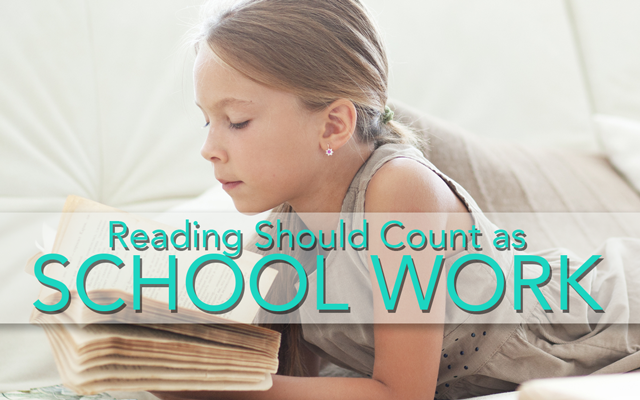Reading Should Count as Schoolwork


“Reading through the Lord of the Rings should count as schoolwork,” or so said my 13-year-old son just now. Although I don’t plan on letting him follow Frodo and Pippin’s adventures to the exclusion of all else, he does have a point.
Long ago, about the time I first devoured the Lord of the Rings for myself, my mom went to a homeschool support group near us. It was her first experience of being part of a community of moms who were in the same boat as we were, and being able to vent about some of our foibles to people who would understand was a new experience.
The only thing I can remember her telling us about the meeting was her relieved shock to discover they were envious of her situation with us. All my brother and I wanted to do all day was read. Fantasy, Asterix & Obelix, historical fiction, even Beverly Cleary, when we couldn’t find anything new to try out – we read it all – and our workbook assignments suffered. But those ladies told Mom not to worry about it much.
And they were right. Today, my brother is an engineer, and I’m teaching half a dozen of her grandkids in the same way.
Of course, it is wise to offer our children as wide a range of genres as possible, rather than allowing an unbroken literary diet of a single, favorite style. But stories are one of the most powerful educators we have at our disposal.
I am so thankful there have been a number of authors working to make even the Christian biographies palatable. Much like one might add vegetables to the mix in a way that increases the chance the kids will enjoy them, so real-life stories of Jesus at work in real people, not so long ago, is a potent tool for spiritual growth.
Many stories, fiction or not, are set in other cultures and times. Laura Ingalls Wilder has introduced thousands to what it was like to grow up on the mid-19th Century American frontier. How many of us can relate better to Bible times, the Roman Empire, ancient China, and any number of different civilizations because of the power of stories?
Even stories set on other planets, or with impossible circumstances, are a chance for education. For me, the Lord of the Rings was a huge help to process the reality that many of Jesus’ people are asked to walk some dark paths, up to and including torture. I could barely stand listening to my dad reading about the Foxe’s Book of Young Martyrs; it was impossible for me to picture myself standing strong against opposition like those teens faced. Walking with Frodo and Sam, one step at a time, helped me see how doing one tiny right thing after another is all Jesus asks of me. And my promised reward is far greater than theirs!
Any well-turned story is going to be about developing character. The Hero’s Journey template is all about deciding to do the right thing, even when you have to grow up in uncomfortable ways to reach the goal. And most stories are about relationships. Personally, I’ve never been much of one for romance, as it used to make me lonely, and now I’m careful not to compare my real-life husband to Mr. Darcy and other impossibly charming men, but relationships of all kinds are developed in books to a degree that movies are forced to skim over. Many of the classics owe as much of their success to their portrayal of friendship and love as to plot or setting. Charlotte’s Web, anyone?
Lastly, although “Follow your heart” and “You are the answer to the world’s problems” are things I carefully warn my children about [besides any obvious immorality or violence the young adult (YA) section includes], whatever the literary quality of a book, any time kids are reading, they are developing their minds. Theater of the Mind is a muscle that applies to far more than entertainment. Imagination and a rich inner mind are highly prized skills in this passive generation, and reading is the same skill, whether it’s a story or a textbook; the more exercise a student gets with handling words, the easier it will be to focus on the concepts.
So, if you keep finding your child holed up somewhere, sneaking a novel, go ahead and pull them back to their math but, like my mom, remember that education is mostly about teaching kids how to learn, and even God thinks books are the way to go for that purpose!
Cheri Fields is a 2nd generation homeschooler involved in learning and teaching at home since 1982. She currently teaches her seven kids in Michigan and has found ways to include them in the online ministry God has called her to, particularly as cohosts for their family’s podcast. You can find her at https://creationscience4kids.com. She is a member of the International Association of Creation and a graduate of the Institute for Children’s Literature.










































